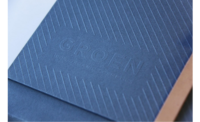Labels matter when purchasing beauty products

Clean, green products continue to remain top of mind for many women when it comes to personal upkeep. A new survey shows more than half (55%) of all women check ingredient labels on beauty products prior to purchase, and more than one in three (35%) intend to purchase more all-natural beauty products in the next two years than they currently do.
The second annual Green Beauty Barometer survey was commissioned by eco-luxe beauty brand Kari Gran and conducted online by Harris Poll on the company's behalf in August 2016. The survey was among more than 1,000 U.S. women aged 18 and up, and measured attitudes and purchase behaviors across a number of beauty product categories, including skin care, hair care, makeup, sunscreen, fragrance and nail care.
Key Findings
The Greenest Gals: Millennial women (18-34) by far showed the most interest, with 73% indicating it is important to them to choose all-natural beauty products when making a purchase. This is compared to the next highest demographic of women aged 35-44, with 59% of them making the same claim.
More Green, More Green: The all-natural beauty niche continues to make its way mainstream, with one-third (35%) of women planning to purchase more all-natural beauty products over the next two years. Millennial women took the top spot (48%), followed by women 35-44 and 55-64 (35% each), women 45-54 (29%) and women over 65 (21%). What will they purchase more of? The top three all-natural categories Millennials will purchase more of are hair care (35%), skin care (33%) and makeup (30%). Specific to skin care, a further 14% of Millennial women say they will only purchase all-natural products, representing the highest commitment to green products among all categories and age demographics.
Ingredient Labels Matter: 55% of women shoppers, and nearly two-in-three (62%) Millennial women, read beauty product ingredient labels prior to purchase in order to avoid specific ingredients, including chemicals. The most deterring chemical ingredient was sulfates, with 30% of women saying this ingredient would prevent them from purchasing a beauty product, followed by parabens at 22%. Rounding out the top five were synthetic fragrances (18%), oxybenzones (12%) and PEG compounds (11%).
Skin and Hair Care on Top: Skin and hair care products took the top two spots out of the product categories measured, with 53% and 50% of all women, respectively, claiming purchasing all-natural products in these categories was important to them. This was followed by makeup (40%), sunscreen (40%), fragrance (33%) and nail care (29%). When measuring only among women who use products in each specific category, the numbers increase – 57% of women who use skin care products say all-natural purchases are important, followed by those who use hair care (51%), makeup (49%), sunscreen (46%), fragrance (40%) and nail care (36%). Notable among women who purchase skin care products, 67% of those 18-34 said all-natural was important, significantly higher than the next closest age demographic, 35-44, at 58%.
For the Children: Of all the socio-economic factors, whether or not a woman has children living in the home makes an impact on her propensity to value green beauty products. Among all beauty categories measured, (69%) of women with children in the home claimed opting to purchase green beauty products was important, versus (56%) of women with no children in the home.
The West vs. the Rest: In total, more women in the Western U.S. (64%) feel purchasing all-natural beauty products is important, as compared to women in the South (62%), the Northeast (59%) and the Midwest (56%).
Retailers Missing the Mark
The annual survey also measured how satisfied women are when it comes to green beauty product offerings among specific retail channels. Data shows retailers are meeting the demands for many shoppers, but likely are still leaving a lot of dollars behind.
"Our results showed nearly 15% of women who shop for beauty aids in mass market drugstores, specialty drug or grocery stores or department stores are unsatisfied by the selection of all-natural products," comments Lisa Strain, co-founder of the Kari Gran eco-luxe skin care and makeup brand. "All indications show the demand for green beauty remains strong, and this is a pivotal shift for the long term versus a fleeting beauty fad."
Looking for a reprint of this article?
From high-res PDFs to custom plaques, order your copy today!






